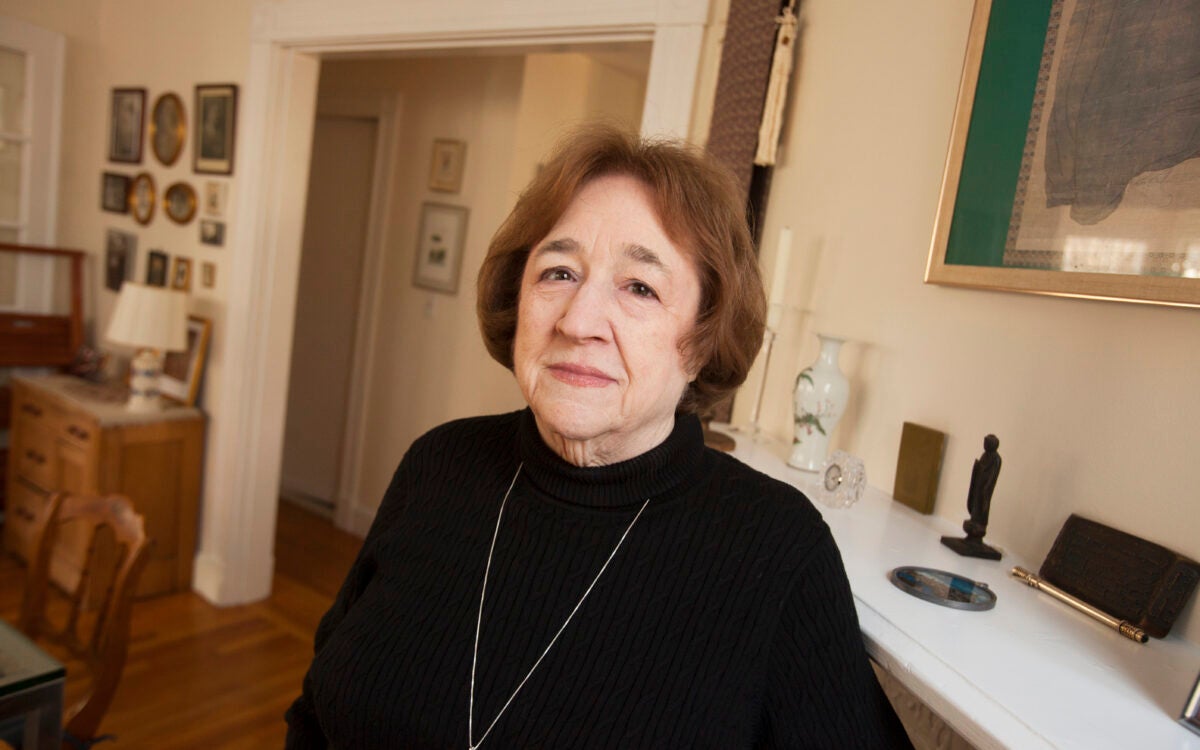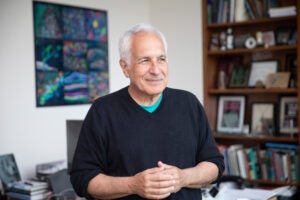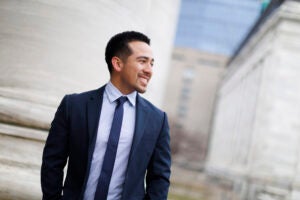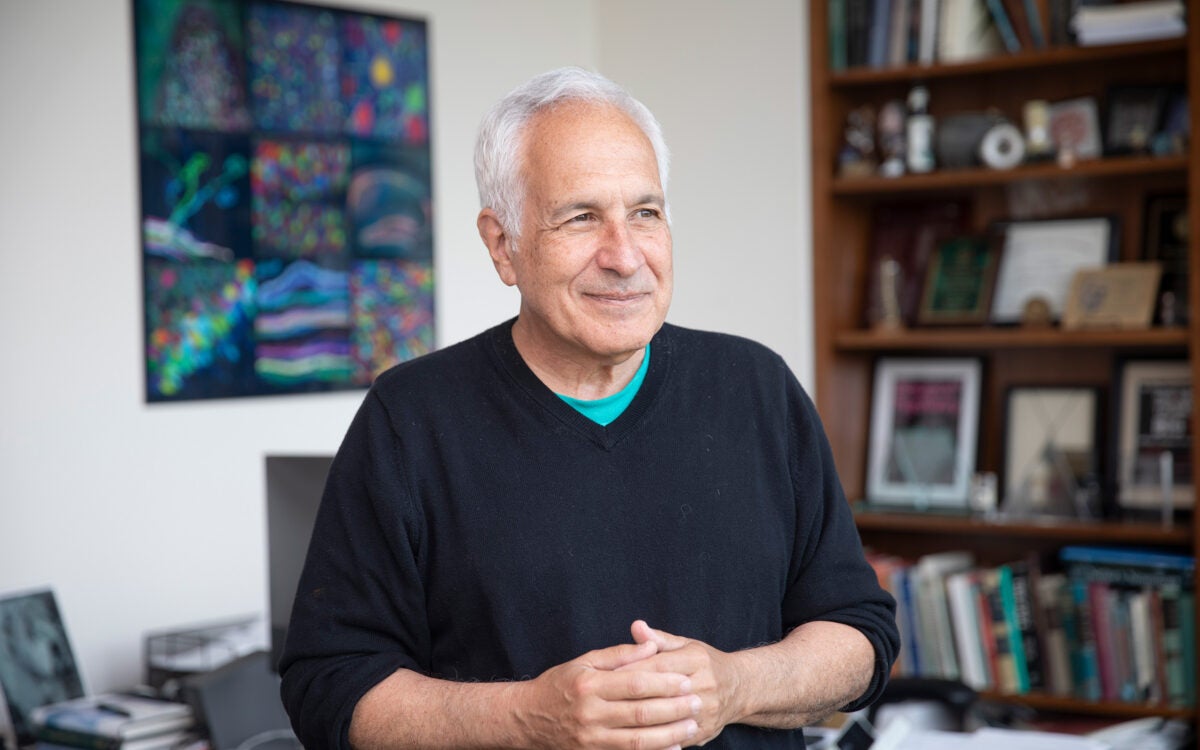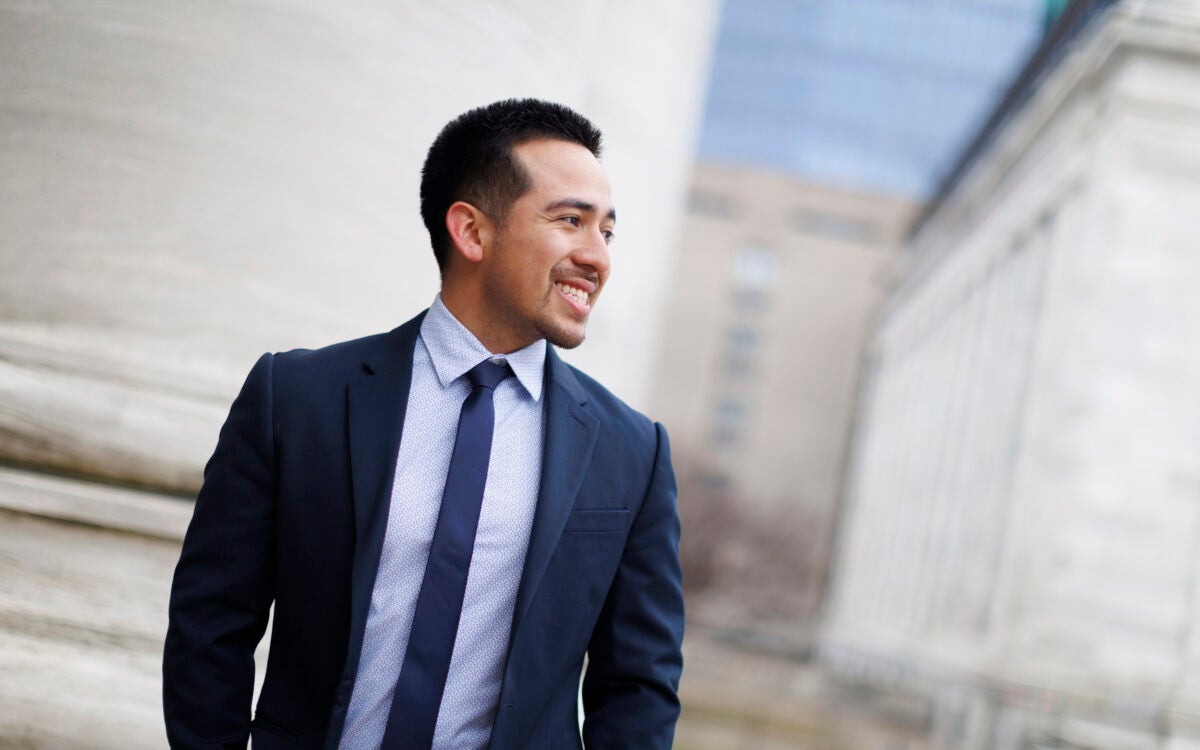Gaining traction
Dean Ryan reviews first year at School of Education, charts next steps
It’s a tumultuous, exciting time in the field of education, an era when traditional notions about effective teaching and learning practices are undergoing massive shifts, in large part because of rapid-fire advances in science and technology.
Stepping into this maelstrom a year ago as new dean of the Harvard Graduate School of Education (HGSE) was James Ryan, a soft-spoken, steady administrator and teacher. A leading national authority on education law and policy, Ryan came to Harvard from the University of Virginia Law School, where he had been a distinguished professor and served as academic associate dean from 2005 to 2009.
In announcing Ryan’s appointment, President Drew Faust called him “an outstanding scholar, teacher, and academic leader with a deep passion for improving education and for enhancing the interplay of scholarship, practice, and policy,” while noting that she was “impressed by his seamless integration of the intellectual and the practical, his warm and open personal style, and his evident talent for drawing together people from different backgrounds, disciplines, and points of view.”
Ryan’s research focuses on educational opportunity and how law and policy decisions shape schools, administrators, teachers, and students. His 2010 book, “Five Miles Away, A World Apart,” probed many of the defining issues in education — economic inequality, desegregation, school choice, standards, and testing — through the lens of two economically and racially disparate high schools in the Richmond, Va., area.
In a wide-ranging interview, Ryan reflected on his first year as dean, his priorities for the new academic year, and how HGSE will navigate the rapid changes happening in education.
GAZETTE: How has life changed for you and your family since coming to Harvard?
RYAN: It was a big change, as you might imagine. We had been in Charlottesville for 15 years, and we have four school-age kids, now 17, 15, 13, and 8. Everything was new — new school, new house, new job for me, new job for my wife, Katie — and it was a pretty difficult transition at times, to be honest. The first six months were fairly rocky. In addition to all these changes, we had this odd series of calamities occur just completely coincidentally: a tree branch fell on our car, one of our dogs ran away, another dog needed an operation, our son broke his wrist, our daughter was bit by a dog and needed stitches, and my father-in-law needed his hip replaced. It was a fairly tumultuous first six months [laughs], but everyone has settled in and I think to a person is quite happy that we’re here.
GAZETTE: Culturally, I would imagine there were some adjustments?
RYAN: Katie grew up outside of Boston, so this has always been home to her, and I grew up outside of New York City. We have been coming up to Essex, Mass., for the last 11 summers, in part to be closer to Katie’s parents, who live in Hamilton. So we’re both familiar with the area, and our kids were also familiar with it. So it wasn’t as much of a culture shock as it would have been if we had moved to someplace where we’d never spent any time. Still, leaving our friends in Charlottesville was difficult for both our kids and us.
GAZETTE: What were some of your worries or expectations about living here?
RYAN: I was mostly worried about our kids’ transition into school and their leaving one set of friends and making a new set of friends. The social part of the transition went much better than I expected and was fairly seamless. They all play sports, which is a very easy way to get to know a group of kids pretty quickly. The academic part of it was trickier, in part for our oldest because a number of courses are sequential — language courses and math in particular — and where they finished in Charlottesville and where they were expected to be here was different, there was a gap for some of them, and that proved a little challenging.
GAZETTE: Have you had much chance to explore Boston/Cambridge and New England yet?
RYAN: Yes, a fair bit. We moved to Lincoln because it reminded us of Charlottesville, and some of our favorite places are right in Lincoln, including the deCordova [Sculpture Park and Museum] and Drumlin Farm. In the city, we’ve spent time at the Aquarium, which I really like, the Swan Boats, which I still adore, and Fenway [Park], which I love even though I’m a Yankees fan. Katie and I are also runners and huge fans of the Boston Marathon, and this was our fourth year in a row running it.
GAZETTE: How was that experience in the aftermath of the Marathon bombing?
RYAN: It was really a magical experience. It was obviously emotional given what had happened the year before. The crowds are always incredible at the Marathon, but even more so this year. There were so many more people watching, and everyone was enthusiastic. It was especially nice for me to see some of my colleagues and students on the course. It was one of those instances where I felt like, “OK, this is home.”
GAZETTE: What has surprised you so far about the job?
RYAN: I would say three things have surprised me. One is how many people were eager to help me as I started the job and as I continued on during my first year, from people in this office all the way up through and including Drew Faust. The outpouring of support was not something that I expected, and I’m immensely grateful for it. I work with an incredible team in my office. My faculty colleagues and the staff throughout the School are phenomenal. And it was obvious that they all were interested in helping me make the transition. That was also true of my fellow deans throughout the University, who were an incredibly welcoming group and filled with great advice. And both [Provost] Alan [Garber] and Drew have been enormously helpful. But in addition to that, a whole series of alums and friends of the School made it clear that they were invested in my success, and that was a really pleasant surprise.
The second is how quickly I felt at home here. I think it’s in part because of the offers of help, but in part it’s because this is just a genuinely warm and welcoming community that cares deeply about education. I’ve been interested in education for so long and have cared about it for so long, to be in a place where everyone else is as interested and passionate about it as I am made it seem like the right place to be quite early on.
Third, I’ve been surprised by how many meetings I have to attend [laughs].
GAZETTE: Even though you’ve been in education for a long time?
RYAN: [Laughs] I have been in education a long time, but the difference between the number of meetings a faculty member needs to attend and the number of meetings a dean needs to attend is quite significant.
GAZETTE: Let’s talk about some of your highlights during this first year.
RYAN: The student orientation at the very beginning of the year and graduation at the end of the year were two highlights. At the orientation, the dean gives a welcoming address. It was my first major public address and the moment where I realized that this was really happening and I was really the dean. Just the view from the podium looking out into the crowd of the 600-plus students brought home how significant this job really is, how I really did have a responsibility for a large number of people, and that they were counting on me to do the best job possible.
Fast-forward to graduation. It was a remarkable occasion, full of pageantry, which brought home the magic of the University. To see everyone collected onstage and everyone out in the audience, the students and their incredibly happy families. I was as nervous there as I was at the orientation, even though I only had to say three lines. But it was still a nice moment to pause and reflect on the first year.
In between, I would say one highlight was learning from students, faculty, and alums just how deeply they care about this place and how much it’s meant to them over the years. This is a place that inspires a great deal of loyalty. It was great to learn that about this community.
GAZETTE: There are a lot of changes happening in the field of education right now. What makes this such a critical time, and where is HGSE in all of this?
RYAN: One of the reasons it’s such a critical time is that we’re witnessing this amazing intersection of need and opportunity. There is a widespread recognition that education in this country needs to improve, and recognition that education across the globe needs to improve, in addition to increasing access. At the same time, there are opportunities for improvement that haven’t existed before, which makes it an exciting moment. Advances in neuroscience are shedding light on how the brain develops and functions, which in turn sheds light on the best way to teach students across a range of capacities and abilities. Advances in learning technologies offer the opportunity to individualize education and increase access to high-quality education across the globe. The very fact that there’s such widespread recognition of the need to improve education — and interest in doing so — itself creates opportunity to address longstanding problems.
We’re trying to have the biggest impact possible through our teaching and research. Through teaching, we’re preparing students to be leaders in the field, because leaders will be able to affect and influence a large number of individuals. With respect to research, our faculty is interested in identifying ideas, policies, and programs that work. There is still a big need for better and more reliable research on what works in education.
GAZETTE: What are some of your top priorities for the upcoming academic year?
RYAN: I have five priorities for this year. The first is faculty hiring; the second is the public launch of our capital campaign; the third is solidifying our presence online and devising a strategic plan going forward for what we will do online; the fourth is furthering some initiatives started this year, [such as] creating a Harvard teacher fellows program that will enable undergraduates to get into teaching through the Ed School, and Usable Knowledge, [a] project devoted to disseminating the research that’s conducted here to those working in the field; the fifth is to continue to enhance the intellectual life and community on campus.
In faculty hiring, we have a number of searches planned for the year. We are at a key moment in the history of the School. A lot of our senior faculty have retired recently, and others are planning to retire in the next five to 10 years. This means we’re at a point of generational change among the senior faculty, which is a poignant moment because our senior faculty are a phenomenal group. It’s a huge loss to see them go, but it’s also a remarkable opportunity to shape the future of the School. The heart of any school is its faculty, and so my very top priority is to make sure that we attract the very best faculty in the world to this School, and that once we attract them, we retain them.
GAZETTE: What have you learned from faculty and students about what their needs are and how they’d like to see the School evolve?
RYAN: I think faculty are interested in their work having an impact and interested in receiving the help and guidance necessary to make that happen. Research takes a good deal of time and a great deal of effort, and you hope that if you have produced a good idea or a paper that provides a reliable evaluation of an existing program that the news will get out. But often it doesn’t. And faculty don’t really have the time to spend making sure their research is disseminated. It seems to me one thing that we can do as a school institutionally is make that effort — in partnership with faculty — in order to ensure that their work is disseminated as widely as possible.
For students, I’ve heard a few recurring messages. One is that they would like more opportunities to focus on and prepare for working in diverse contexts. For students going to work in urban school systems or suburban school systems, they would like more opportunity to talk about how to work and thrive in a diverse setting and more opportunities to have sometimes-difficult conversations about race and gender and sexual orientation. We’re going to have a common theme this year focused on the issue of diversity, and we’re calling it “Fulfilling the Promise of Diversity.” There will be a series of book talks, workshops, lectures, and the like, all revolving around this issue, which I think will enhance the sense of intellectual community. From doctoral students, there’s a need for more funding to support research, and from both doctoral and master’s students, there’s a desire to have more opportunities within courses to dive deeper into topics.
GAZETTE: Your campaign launches this month. What are some of the financial challenges the school now faces?
RYAN: Two of the biggest challenges are financial aid for students and funding for research. I would like to increase the financial aid available for master’s students because I think many of them are graduating with too much debt. It’s imperative that we continue to provide generous funding for our doctoral students. Our goal should be to attract the most talented students that we possibly can and make cost not a factor in their decision about whether to attend. I don’t know if we’re quite there yet. Federal funding for research has generally declined, and that doesn’t seem like it’s going to change anytime soon, which means we also need to be looking at alternative sources for funding research.
GAZETTE: Education sometimes gets criticized for being a series of reform initiatives that don’t deliver on their promises. Is that a fair knock, and if so, what’s the cause of the ineffectiveness?
RYAN: I think that education itself as a field, as opposed to education reform in particular, has suffered from what you might call faddishness for a long time. There’s a great deal of churning from one policy or practice to another. I think that is often driven by the impatience on the part of policymakers. A new policy or practice will be developed, touted as the Next Best Thing, and lo and behold two years later, when it hasn’t produced a miracle, it’s dropped and something else is tried. I think that breeds a good deal of cynicism and suspicion among principals and teachers. If you look at systems that have been successful — Massachusetts is a good example — what you’ll find generally is consistency in the leadership.
In some respects, success entails picking a program or policy that is sound to begin with, one that is based on research, implementing it faithfully, and then sticking with it even when you hit some bumps — even if the gains don’t come as quickly or as dramatically as you’d hoped. One of the key factors is consistency in leadership, which is crucial to success. Unfortunately, in a lot of urban school systems, you see exactly the opposite. The typical tenure of an urban superintendent is roughly three years.
GAZETTE: Isn’t the problem driven in part by political pressures to have instant results?
RYAN: Exactly. The relevant time frame for someone who’s in political office is pretty short, and often too short to see whether reforms will actually work. So you’re exactly right: There’s this immediate pressure to prove that a reform has had a dramatic impact in a very short period of time and anything that falls short of that — which most reforms will because it takes a little while for the reform itself to take — are often just tossed aside, even though, if given more time, they could very well have worked.
GAZETTE: In the past, the School has had a reputation for being somewhat less rigorous than other [Harvard] Schools. What do you say to that criticism?
RYAN: I know that ed schools generally are often considered not as rigorous as other schools, and I think that there’s some truth to that, depending on the school. But it’s also just a function of the fact that the education profession is, unjustifiably, not as respected as other professions. The only thing to do in response is to provide the very best education program you can, and that will be proof itself. Opening up Ed School classes to the wider Harvard community is also a great way to correct that perception to the extent it still exists. Kay Merseth teaches a general education course that’s open to Harvard undergraduates, and it is both one of the most popular courses and one of the most highly rated. Our quantitative-methods classes draw graduate students, not only from across the University but also from MIT, who come here to learn how to do quantitative research.
GAZETTE: What skills and knowledge should graduates leave here with?
RYAN: That’s a great question and one that I’ve talked with faculty a lot about over the last year. At the moment, we don’t have a single set of courses that everyone needs to take, and that’s in part because the master’s program is just one year. Students come to the School with a great deal of experience, wanting to do a number of different things. The belief has been that students should be prepared for the role they want to play and that will require particularized knowledge.
I recognize that, but there is a part of me that thinks we should nonetheless identify a basic body of knowledge that we would expect everyone to know when they graduate. That would include things like a basic knowledge of human development; of how students learn; of schools as organizations, including knowing about school governance and finance; and how to be, at the very least, sophisticated consumers of research, so understanding some basics about research methods. This doesn’t necessarily translate into a set of required courses, but it’s at least a start in thinking about it. I also think that there are some common skills we should expect, including the ability to use evidence to make decisions, which again means the ability to consume education research. But beyond some core skills and knowledge, I do think students need the opportunity to prepare specifically for the roles they hope to pursue when they graduate.
This interview has been edited for clarity and length.
